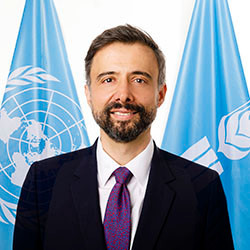UN Food Systems Summit + 2 Stocktaking: Building Africa’s Food Sovereignty and Resilience through Sustainable Investments
IFAD Asset Request Portlet
Asset Publisher
UN Food Systems Summit + 2 Stocktaking: Building Africa’s Food Sovereignty and Resilience through Sustainable Investments
Statement By Alvaro Lario President of IFAD
By Alvaro Lario
Location: Rome, Italy
25 July 2023Check against deliver
The crises of the past two years have underscored the crucial role of small-scale producers and small agri-businesses to national food security.
In Africa this is particularly true.
Africa has a talented, youthful population, vibrant markets and enormous potential. Not only can Africa feed itself, it can help feed the world. But reaching this potential means transforming food systems – and for Africa, the estimated cost is US$77 billion a year.
IFAD is committed to working with African governments and businesses to make this transformation a reality.
IFAD is an international financial institution solely dedicated to investing in and with rural people, notably small-scale food producers.
We allocate 100% of our members states’ contributions to low-income and lower-middle-income countries. Over 50 percent of our project financing goes to Africa, where we expect to invest around US$3 billion in the next 5 years. Climate change is 100 per cent mainstreamed in IFAD's portfolio, and 90 per cent of our climate investments are in climate adaptation.
IFAD is an assembler of development finance, bringing governments, development partners, the private sector, farmers’ organizations and rural people together so that our collective investments deliver larger, more sustainable impacts per dollar invested.
Between 2019 and 2021, these investments led to 77 million people increasing their incomes.
We work with rural people from the start. They invest their time and even their own money, and play an active role in project design and implementation. Over more than 45 years of operating worldwide, we have seen everywhere that development is more effective and sustainable when it is driven by the participants themselves.
We always make sure no one is left behind, including women, youth, people with disabilities, vulnerable groups and indigenous peoples, so that rural women, men, and youth have the tools, financial services, know-how, and support to drive change in agriculture and food systems, while staying resilient to shocks – from climate change, market shocks and impacts of institutional and political fragility.
That can mean everything from investing in inclusive and responsible value chains to promoting blended finance and innovative technology.
Over the years, we have expanded the financial instruments to better serve the needs and particularities of borrowing countries. Historically, we provided funding almost exclusively through sovereign loans and grants. And this is still our focus. But in recent years we have expanded our portfolio of instruments with a Private Sector Financing Programme for micro, small and mid-size enterprises in rural areas.
Today, many African governments face rising debt distress, inflation, and very limited fiscal space, partly as a lingering result of the pandemic.
International financial institutions have a responsibility to work with governments to expand finance for investment in food systems. At IFAD, we are building a coalition of domestic and regional Public Development Banks, like BNDES in Brazil or Banque Agricole du Niger, that can invest for the long-term to support rural economies, including small producers.
This is also why IFAD and the World Bank worked together to fast-track the development of the Financial Flows to Food Systems (3FS) prototype to provide data on financial flows to food systems.
The 3FS will provide decision makers with annual trends in domestic public and international development financing to food systems. It can generate high-level political attention to finance gaps, and show how ODA funds are being allocated across food systems.
Food systems are woven into the texture of all our lives, and economies and societies as a whole. We need to ensure Africa’s governments and people have the tools to turn their vision- for food sovereignty into policy action and into concrete investment opportunities.
I look forward to continuing to support Africa’s agenda for food system change. We will continue to focus on small-scale producers and rural entrepreneurs and on leveraging diverse sources of capital and knowledge. This is our commitment to African countries.
Thank you.
